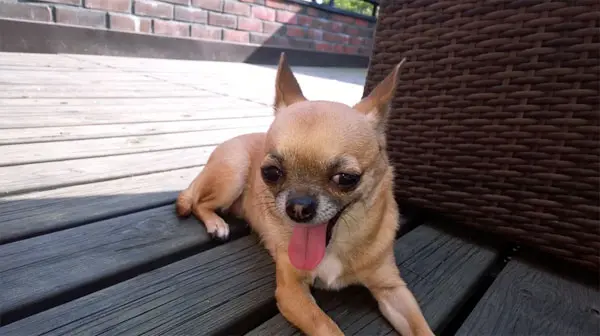
To ensure the health and well-being of your chihuahua, you need to be aware of possible health concerns, especially during the first 16 weeks of their life.
The following health information is not intended to diagnose, treat, or replace the care of a veterinarian. It is also not intended to dissuade you from obtaining a Chihuahua. After about 6 months of age, Chihuahuas are generally healthy little dogs which live a long lifespan.
Parvovirus
Even though Chihuahuas need to be socialized at an early age, it is best to avoid taking your pet to the park, on walks in the neighborhood, or around other unknown pets until it has been fully vaccinated and has a fully developed immune system (usually 16 weeks of age). This is because until your Chihuahua has had its full set of vaccinations, its immune system may not be properly equipped to handle diseases with which it could come in contact. Your puppy could easily get worms, parvovirus, or coccidia from contaminated feces or ground. Unfortunately, these diseases can live in feces and on the ground for many days and can be easily transmitted to a puppy. Puppies are very curious of their new surroundings and will go smelling around the ground and trees where another contaminated dog or cat may have left their markings.
Symptoms: Symptoms could vary widely, depending on which disease your puppy has come in contact with. Parvovirus often causes either depression, vomiting, diarrhea and/or cardiac problems (Myocarditis). Myocarditis usually results in the puppy stopping nursing, crying out, and gasping for breath. Coccidiosis can cause diarrhea, dehydration, appetite loss, and anemia.
Treatment: Seek veterinary treatment immediately if your puppy has come in contact with any of these diseases and has not been fully vaccinated, as they can cause death in your puppy. Of course, an ounce of prevention is worth a pound of cure. Avoid contact with other animals and unknown places prior to full vaccination of your puppy. Have those people who handle the puppy wash their hands before handling. Since parvovirus can also be carried on the bottom of your shoes, it is a good idea to keep shoes that you wear outdoors from contacting any area where the puppy sleeps/plays.
Low Blood Sugar (Hypoglycemia)
Because Chihuahuas have such a small fat reserve around their liver, they are prone to low blood sugar. Although this can occur at any time, it’s especially important to watch your new puppy due to his small size.
Symptoms: Lethargy, lack of coordination (stumbling, falling, staggering), followed by coma and death if not treated.
Treatment: Although you should always consult your veterinarian for the proper treatment of your particular Chihuahua, you can keep some sugar handy (e.g. Maple Syrup, pure honey) to boost your little friend’s blood sugar level stays when it starts dropping. The Vitacal supplement is essential for any pet owner’s medicine chest. It is specially formulated to give your pet the nutrition it needs and fast. It has been known to bring a puppy suffering from low blood sugar immediately out of the beginning stages of a coma. It also has high potency vitamins, minerals, fats, and carbohydrates which your puppy needs. Because it is high in B vitamins, Vitacal can actually stimulate your pet to start eating right again. We recommend it be taken home or purchased immediately after taking home a Chihuahua weighing less than a pound and a half. It can very easily save his life. It costs less than $5.00, much less than an emergency trip to the vet. VitaCal is especially beneficial for pets that are stressed (due to a change in environment or a new home) or recovering from illness or injury. It is also specially formulated to be gentle on sensitive digestive tracts, and can also be used for kittens. Each ounce provides 90 kiloCalories of usable energy. VitaCal can be ordered from Drs. Foster & Smith, R.C. Steel, or Becky’s Chihuahuas. Or you may be able to obtain it through your veterinarian.
For severe cases of low blood sugar, your veterinarian may need to give an IV of a sugar solution. As a precaution, you can always make sure that when you’re going to be away for a while that your little friend eats before you go and that you leave him food for when you’re gone. Don’t feed him candy, as this can cause the blood sugar level to surge and then drop drastically.
Slipped Stifle (Luxating Patella)
Slipping knee joints (also referred to as luxating patellas, slipped stifles) are a common problem in small breeds. In this condition, the kneecap slips out of its groove and moves against the thighbone (femur) instead of along its natural groove. Although this has been found to be a heritable condition, small, active breeds are likely to aggravate it through the course of their natural activities (jumping up and down) around taller objects such as furniture.
Symptoms: Rear leg lameness, shifting from one leg to another, hopping and/or skipping, and an inability to fully extend the leg, and can result in arthritis over time. Some breeders recommend doing one of the following when buying a puppy to determine if it may have a predisposition to a slipped stifle: (1) See if young puppy’s back legs cross at the ankles when lying on its back. (2) See if young puppy sits up straight, rather than leaning, when sitting on his haunches.
Treatment: See a good veterinary surgeon who can diagnose the severity of the problem and recommend the correct treatment. Treatment usually involves correcting the problem surgically, where the type of surgery is determined by the severity of the condition. If treated early enough, the condition can be repaired such that the pet can lead a normal, healthy life.
Stress (common)
Because Chihuahuas are such a small breed, stress (such as diet changes, moving to a new home, etc) can affect them physically.
Symptoms: Coughing, Diarrhea, Hypoglycemia, Infection
Treatment: Always check first with your veterinarian to rule out a more serious reason for these symptoms, but coughing, diarrhea, and low blood sugar are fairly common Chihuahua responses to stress. Many of these symptoms are temporary and will go away once the Chihuahua gets used to their new environment or situation. Of course, you need to treat low blood sugar as described above. Because stress can cause the immune system to become depressed, this may make the puppy susceptible to bacterial and/or viral infections. Your veterinarian will best be able to diagnose this and prescribe antibiotics in the case of a bacterial infection.
Vaccinosis
Because Chihuahuas are so small and because vaccine manufacturers recommend giving the same amount of vaccine to a Chihuahua as to a Saint Bernard, Chihuahuas may be more susceptible to vaccine related problems.
Possible Symptoms: Lethargy, depression, and possibly death
Treatment: Vaccines are a very controversial subject and one you should discuss with your veterinarian. The information presented here is just an opinion and not to be used as a substitute for proper veterinary advice. Many Chihuahua breeders were losing puppies a few days after giving vaccines (especially the tiny ones) and once they started giving half doses of vaccines (the killed vaccines rather than the modified live ones), and they quit losing their puppies. Logically, you would wonder: “Why give the same dose of a vaccine to a 90 pound dog that you would to a 3 pound dog?” Even within the breeding community, there is dissension about which vaccines to give. One breeder has quit giving the Leptospirosis Vaccine to their puppies based upon research at Kansas State University that suggests that there are more reactions to this vaccine than to others, and that Leptospirosis is pretty rare. Another breeder has not had any problems with this particular vaccine, although it is not given to their pups until 4 months of age. In the final analysis, the decision when and how much to vaccinate is left to the owner’s and their veterinarian’s discretion.







86 Comments. Leave new
I have a 13 year old chuwawa and she has had a fatty tumor on her back for around 4 year and she has started limping is there anything that can be done. I also have been giving her dentastix for a few years now and tarter wipes she stopped chewing on the dentastix and has some brown on her teeth she also has been sleeping alot is that just old age or should the vet check her out.
My 4yr old chihuahua just started walking wobbly on her back legs. I’m unsure of what could be the issue. This was right after I finished cleaning the living/dining room & kitchen. Im hoping that she is alright.
my 7 yr old female is constipated ive had her almost 2 yrs she will not eat dog food ive tried everything. ive tried a misture of pumpkin rice chicken. she is seldom active. please help
I love chihuahuas
I have had 2 both deceased
I am 83 and have a chance to ge ta 9 year old chihuahua whose owner died
Will this be a good idea for the dog and me?
My apple head chihuahua is about 11 weeks old and used to be very greedy but for the past few days he’s been just laying around and vomiting .. What could be wrong?
My 3 year old chihuahua was spayed a year ago and has continued weight gain ,troubles with getting around and very heavy breathing. Tonight she began to go into a corner and tilt her head to the left and down and walk in almost circles. I went to rub her head and she started yelling! Her breathing is getting worse and I’m concerned. Any thoughts , comments or maybe similar experiences would be greatly appreciated TIA
My 12 pound chihuahua has flea bites with bumps ,ive tried everything, i know, what can i give him?